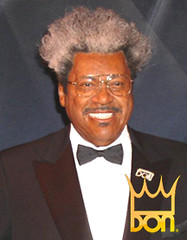
When Don King first decided to tease his hair up to make a crown fitting for his infectious smile, booming laugh, and inimitable vocabulary, he quickly became globally recognizable as a universal boxing promoter. But while his flamboyant style is the stuff of legend, he never forgot that he came from a hardcore Cleveland ghetto nor did he mistake his larger-than-life-image for anything other than a recognizable badge that symbolized his personal brand and reputation.
"Nothing makes me happier than to promote a fight card with boxers from 10 different countries: the fighters, the corner men, the media, the business people-all of them," says King. "The thrill comes when these people, who would never normally come into contact with one another, work together on an event. They learn that no matter what color, race, religion or whatever you are, underneath the skin we are all the same on the inside."
It's a lesson that can be easily applied to social media participants. Somewhere along the way, some so-called social media elite seem to be forgetting that it takes more than a flash-in-the-pan rock star image to establish a reputation. And those who covet these sometimes larger-than-life online images wonder how they too might establish a network of fans and followers.
There are no fans or followers. There are only people.
When I first heard Geoff Livingston decided to take on personal branding, I thought we might disagree because personal branding can be important.
However, in reading his post, it quickly became all too clear that while our definitions are different — as I view personal branding as the relationship between the person and other people — we're on the same page about image promotion. The role of the communicator is not about building ego-based images that eclipse the companies and clients they work for.
Social media consultants rely on personal brands,” Livingston writes. "Communicators rely on building value between organizations and their stakeholders.”
I'll go a step further. Consultants who rely on personal image promotion over organization value propositions drive wedges between the organization and stakeholders to such a degree that the organization risks considerable long-term damage despite any short-term gains. Rock star images and other personalities aren't establishing a relationship between organizations and stakeholders; they only establish relationships between the organization's stakeholders and themselves.
Twitter adds to the confusion of people vs. business presence.
During and after yesterday's webinar and the IABC/Las Vegas post discussion, I learned more from the participants than they learned from me as is often the case. Enough so that the material covered deserves its own post next week, but I would be remiss not to mention one point as it relates to this topic.
There seems to be considerable misinterpretation being made when people learn about applying social media, especially presence applications such as Twitter. It isn't what either Aaron Uhrmacher presented during the session and what I discussed with participants in Las Vegas after the webinar or what social media experts tell their clients every day. Rather, it stems from the simple observation that social media lessons are easy to misinterpret.
When session participants hear that the number of followers adds value to Twitter, some translate that into pursuing followers. While the statement is true, the translation is not. In fact, it is such translations that reinforce the notion that there is a "Twitter strategy" with the goal being to get to the top of some list, which reinforces the need to be a rock star.
Yet, when the objective of social media merely becomes presence inflation, it distracts from any communication objective.
Such translation issues are not exclusive to social media. The same misinterpretation occurs in public relations when public relations professionals tell clients that all press is good; therefore the objective becomes pursing press and the measure becomes column inches. It is not true in public relations nor is it true in social media. The measure is not how much press or social media presence can be earned, but rather how capable the company is in communicating a message that reinforces its strategic objectives through various distribution channels such as the press or engagement channels such as social media.
The measure is not how many followers it takes to be an "influencer" but rather the consistent quality of content and the relationships established based upon those conversations that result in real engagement. For example, when Ryan Anderson lost his wallet in Las Vegas, we didn't just have a conversation about it. We did something about it. And, when he learned that we were raising money for the Arthritis Foundation, he did something about it.
All the followers in the world could not provide a more suitable solution. Hmmm ... still don't get it? Although he was talking about being charitable, you could swap out "a truly charitable gesture" for "strategic communication" from the king of image promotion and it might just drive the point home. That's right. Say what you will about Don King but he gets it.
"If you do something just to get noticed, then it is not a truly charitable gesture." — Don King












